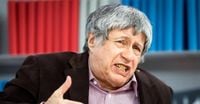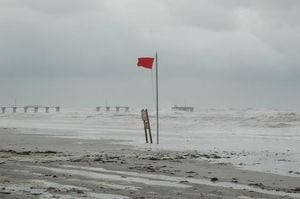Ivan Klíma, one of the Czech Republic’s most celebrated authors and a steadfast opponent of totalitarianism, died on October 4, 2025, at his home in Prague after a long illness. He was 94. Klíma’s life and literary legacy are deeply intertwined with the tumultuous events of twentieth-century Europe, and his works—translated into more than thirty languages—remain a testament to the resilience of the human spirit under oppression.
Born Ivan Kauders on September 14, 1931, in Prague to a Jewish father and a mother who converted to Judaism, Klíma’s early years were marked by profound trauma. At just ten years old, he and his family were deported by the Nazis to the Theresienstadt concentration camp, where he remained imprisoned from 1941 to 1945. Miraculously, the entire family survived. The experience left an indelible mark on Klíma, shaping both his worldview and his future writing. According to The Associated Press, Klíma once reflected, “There’s only life or death. Nothing else matters.”
After the war, Czechoslovakia came under Communist rule. For a time, Klíma, like many young intellectuals, believed communism might offer hope for a better future. He joined the Communist Party in 1953, the same year his father was imprisoned on political grounds. But the regime’s repressive nature quickly became apparent. Klíma was expelled from the party in 1967 after he openly criticized the government in a speech at a writers’ meeting. A year later, the Soviet-led invasion of Czechoslovakia crushed the Prague Spring—a brief period of liberal reforms under Alexander Dubček—and Klíma’s writings were banned.
During this period, Klíma emerged as a prominent editor and literary figure. He edited the journal of the Czech Writers Union and championed writers who rejected the constraints of Socialist Realism, instead calling for radical reform and free, multiparty elections. As The Telegraph notes, Klíma “went far beyond what most of his colleagues had in mind,” advocating for a truly democratic society.
The crackdown that followed the Prague Spring forced Klíma into exile in the United States, where he taught at the University of Michigan from 1969 to 1970. Yet, unlike contemporaries such as Milan Kundera and Josef Škvorecký, who remained abroad for decades, Klíma returned to Prague after just a year. He explained in The Spirit of Prague that he needed to live among his own people and write in his native language, even if it meant enduring renewed persecution.
Back in Czechoslovakia, Klíma’s works were banned for nearly twenty years. He was forced into a series of menial jobs—street sweeper, bricklayer, hospital worker, and refuse collector—experiences he later wove into his autobiographical works My Golden Trades and Love and Garbage. Despite the hardships, Klíma never lost his sense of humor or his generosity of spirit. American novelist Philip Roth, a close friend, described Klíma as “my principal reality instructor,” recalling how they navigated the gray, oppressive streets of Soviet-era Prague together, a wrench in one pocket and a book in the other.
During this era, Klíma’s writings circulated underground, often smuggled out of the country and published abroad. According to The Telegraph, Klíma and other dissidents sustained a vibrant underground literary salon, risking arrest to keep Czech literature alive. Klíma later remarked that censorship might add to a book’s appeal, but “it can add nothing to wisdom.”
After the Velvet Revolution of 1989, which peacefully ended communist rule in Czechoslovakia, Klíma was finally recognized as one of the nation’s literary giants. He withdrew from public life to focus on writing, a seclusion that lasted for two decades. His books, including Judge on Trial, Love and Garbage, My Golden Trades, and The Spirit of Prague and Other Essays, captured the moral dilemmas of individuals confronted by the machinery of totalitarian states. “The main character is dealing with a key topic for him,” Klíma said of Judge on Trial. “Has the society a right to take anyone’s life? And what has a judge who opposes capital punishment to do in the society that demands it?” (Associated Press).
Klíma’s literary style blended philosophy, drama, realism, and visionary imagery, often focusing on the intersection of love and politics. He was especially interested in how totalitarian societies warped personal relationships. “My particular obsession is with the relationship between a man and a woman,” he once said, but it was the effect of living under dictatorship on those relationships that fascinated Western readers.
Despite the international acclaim, Klíma remained deeply connected to his Czech roots. He studied Czech language and literary theory at Charles University in the 1950s and worked as an editor for several literary journals. His children’s books, in contrast to his often Kafkaesque adult fiction, displayed a playful side and included screenplays for episodes featuring the beloved Czech cartoon hero, the Little Mole.
Recognition of Klíma’s contributions came late but was substantial. In 2002, he received the Franz Kafka Prize for Literature and was awarded the Medal for Outstanding Service to the Czech Republic by President Václav Havel. His books, such as My Merry Mornings and Love and Trash, sold over 100,000 copies each after the fall of communism, according to Ara, and his works remain in print around the world.
Klíma’s memoir, My Crazy Century, published in two volumes, offers a searing indictment of totalitarian ideologies. He described communism as “a criminal conspiracy against democracy,” adding with characteristic irony, “Sometimes it was funny crazy. But mostly it was crazy crazy.”
He is survived by his wife, Helena Mala, a psychotherapist, and their two children, Hana and Michal. To the end, Klíma’s most vivid memory remained the moment of liberation from Theresienstadt. As he told Czech public radio, the experience crystallized the starkness of survival: “There’s only life or death. Nothing else matters.”
Ivan Klíma’s life was shaped by history’s darkest chapters, yet he transformed personal and national adversity into art that resonates far beyond the borders of his native Prague. His passing marks the end of an era, but his voice—unyielding, humane, and fiercely honest—continues to inspire readers everywhere.




